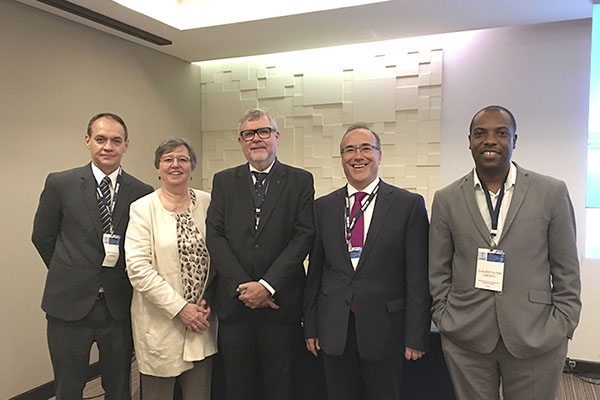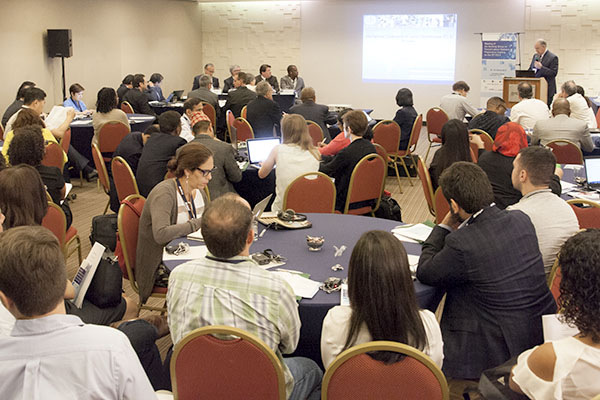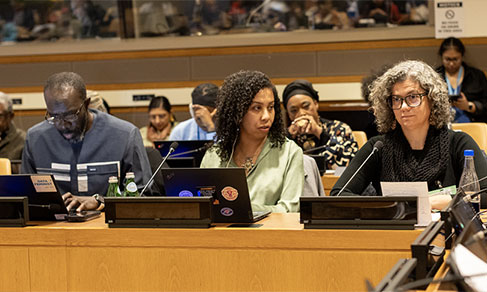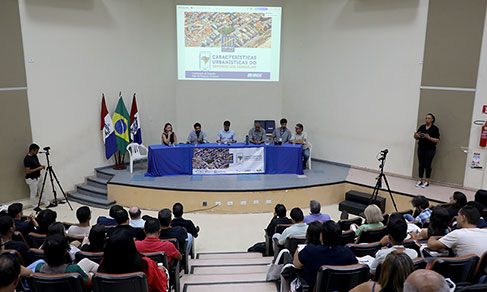ILO Meeting
IBGE receives delegations to discuss statistics on forced labor
March 23, 2018 02h00 PM | Last Updated: June 05, 2018 10h36 AM
In an event ended on Thursday 22, the IBGE received the Working Group on Statistics on Labor Force promoted by the International Labor Organization (ILO). The three-day event in Rio de Janeiro discussed proper methodology to produce indicators relevant to the topic. It involved researchers from 23 countries, in view of the 20th International Conference of Labour Statisticians (ICLS), scheduled for October, in Geneva - Switzerland.
The debates in the group have as main aim to approve a resolution in the 20th ICLS on a methodology to measure forced labor. The production of such indicators is crucial for the fulfilling of the item 8.7 in the Sustainable Development Goals (SDG), which deals with the eradication of slavery-like situations, human trafficking and child labor.
The opening session of the event had the participation of the President and Director of Surveys of the IBGE, Roberto Olinto Ramos and Claudio Crespo, respectively. The ILO representatives were the Director of the Statistics Department, Rafael Diez de Medina, and the Director of the institution in Brazil, Martin Hahn, as well as the analyst of the Department of Fundamental Labor Principles and Rights, Michaelle De Cock.
"It is an honor to hold this event, collaborate with the debate and introduce our team so that we can get involved in the discussion. We intend to have our team more and more involved in the international debates, especially those on forced labor. It is something we have been worrying about, it is an important topic for us.", highlighted Roberto Olinto.

Left to right: Cimar Azeredo, Michaelle De Cock, Roberto Olinto, Rafael de Medina and Claudio Crespo
This week’s meeting is part of a process started in 2013, in the 19th ICLS. Then, the design of a methodology for the measurement of forced labor was announced as one of the targets for the 20th conference.
"The time has come for forced labor to have its concepts well established, and we are very proud of contributing to it. We have advanced a lot in relation to 2013. ILO has improved with the resolution and working group to discuss the methodology on the issue, and here it is. We already have a proposal on how the surveys should be conducted. Despite the limitations, we are better-off than we were in the past. We are optimistic", claimed Rafael Diez de Medina.

“Hard to see, harder to count”
More than setting the standards to harmonize the statistics, the group had the mission of defining an efficient way of measuring forced labor, which is not easily detected in surveys.
"Generating knowledge on forced labor is quite challenging as it is a global phenomenon, which is complex, changeable and adaptable to any circumstances. It is a criminal activity of international scale", highlights Martin Hahn, quoting the concept "hard to see, harder to count.”
The IBGE is considered internationally as one of the pioneers in the adoption of ILO resolutions on labor relations. In order to keep that position, the Institute works to be also updated in the matters of forced labor.
"IBGE's contribution to labor indicators is evident, especially in the partnerships with ILO, started in 2001, with child labor issues. After that, the Institute monitored the concept of decent work", explained Claudio Crespo. "In 2015, we had a new experience as a result of such partnership to tackle labor relations. Related to this topic, there was information on indicators surveyed for the first time in Brazil. We have investigated the role of the employer that held the employee as prisoner due to a financial debit, for example", he added.
"That was a very important meeting because we are talking about forced labor. We included this topic in the PNAD (National Household Sample Survey) of 2015, when we found out there were 1.5 million persons held prisoners by their employers due to debt. It was an important figure, which led us to think of a deeper study for the future", said the Coordinator of Labor and Income of the IBGE, Cimar Azeredo.


















